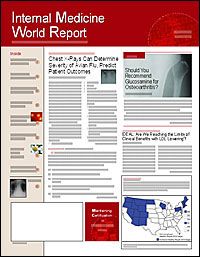Publication
Article
Internal Medicine World Report
Novel Therapies Offer Hope to Patients with Parkinson's Disease
Author(s):
WASHINGTON, DC?Parkinson's disease (PD) is the second most common neurodegenerative disorder after Alzheimer's disease. The search for new therapies for this devastating disease is ongoing, with dopamine neuron transplantation and glial cell line?derived neurotrophic factor (GDNF) delivery via direct brain infusion or human neural progenitor cells being promising strategies for the treatment of PD, investigators suggested at a recent science briefing sponsored by the Na?tional Institute of Neurological Disorders and Stroke that focused on PD research.
Transplanted dopamine neurons may provide functional improvement in pa?tients with PD by replacing the damaged cell population, said Clive Svendsen, PhD, of the University of Wisconsin, Madison. For clinical improvement after neuron transplantation, the transplanted cells must survive, establish functional synapses, reinnervate the denervated stri?atum, and restore regulated dopamine release.
Human embryonic stem cells have the potential to provide a virtually unlimited supply of optimized dopaminergic neurons, Dr Svendsen explained. Studies have demonstrated that human embryonic stem cells may be directed to differentiate into dopaminergic neuronal subtypes with ?distinct functional properties and self-renewal capabilities.
Early open-label trials of human em?bryonic stem cell therapy in patients with PD yielded promising results, but enthusiasm for this strategy waned after the ?disappointing outcomes of clinical trials.
More recent studies suggest that the limited clinical response and off-medication dyskinesia observed in earlier studies may have resulted from incomplete dopaminergic innervation of the striatum by the transplanted cells, Dr Svendsen said. Current efforts are focusing on the development of improved techniques for graft placement and methods for enhancing cell survival and behavioral responses.
GDNF regulates the growth and development of various sensory and sympathetic neurons. It has demonstrated significant anti-Parkinson's effects in animal studies, and findings from preliminary studies in humans appear promising.
In one preliminary study, 50 patients with advanced PD were randomized to receive various doses of GDNF or placebo administered with an implanted intracerebroventricular catheter and access port for up to 28 months. However, "this trial failed miserably, probably because GDNF did not penetrate far enough into the brain tissue," Dr Svendsen said.
More favorable outcomes occurred in a phase 1 safety trial conducted by Dr Svendsen and colleagues, in which 5 patients with PD received continuous intraparenchymal infusion of GDNF delivered via a subcutaneous pump ?directly into the posterior putamen (Nat Med. 2003;9:589-595). After 1 year motor scores improved by 39%, activities of daily living scores improved by 61%, putamen dopamine storage in?creased by 28%, and there were no serious side effects.
At the end of 2-years' follow-up, no ?ser?ious side effects or significant ?detri?mental effects on cognition occurred (Ann Neu?rol. 2005;57:298-302). Patients show?ed 57% and 63% improvement in off-medication motor and activities of daily living scores, respectively.
"We will soon be seeing the results of many studies using alternative methods of delivering GDNF and other growth factors directly into the brain in patients with PD," Dr Svendsen said.





